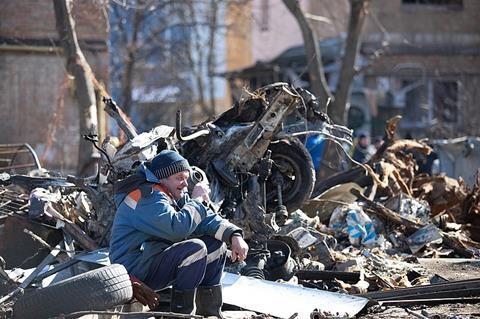Faculty members in the Department of Emergency Medicine at the University of Colorado School of Medicine have been awarded $5 million by the U.S. Department of Defense to work with partners in Ukraine on clinical and logistical challenges associated with modern large-scale combat operations and prolonged casualty care.

The overarching program — Research and Scalable Infrastructure to Improve Outcomes on the Front Lines of Ukraine by Advancing Treatment and Evaluation (RESOLUTE) — is focusing on collecting data related to antibiotic-resistant wound infections, which have substantially increased amid the military conflict.
READ MORE: War in Ukraine fuelling rise in injuries infected with multi-drug resistant bacteria
READ MORE: War in Ukraine pushes highly contagious infectious diseases to alarming levels
The initial project — called the Antimicrobial Resistance Research to Improve Outcomes of Traumatic Wounds study (ARROW) — will enable future clinical trials, testing solutions that help prevent and treat wound infections and related complications.
Tremendous strain
“Ukrainians are under tremendous strain right now, so most resources and personnel have been dedicated to defending the country and providing basic medical care to injured civilians and soldiers,” says Adit Ginde, MD, MPH, professor of emergency medicine and principal investigator of the project.
Ginde worked with the CU Center for Combat Medicine and Battlefield (COMBAT) Research team to secure the research award. Corey Bills, MD, associate professor of emergency medicine, is co-lead investigator for the project.
“The ability to complete this work is important for Ukraine because it is a major issue that they have not yet been able to tackle. It also gives the U.S. military the opportunity to study war injuries during large-scale combat,” says Ginde, who also serves as principal investigator of the Airway, Trauma, Lung Injury, and Sepsis (ATLAS) research program.
Solving immediate data gaps
The conflict in Ukraine has revealed extraordinarily high rates of multidrug-resistant organisms (MRDOs), which can be difficult to treat and frequently lead to complications such as sepsis, amputations, and sometimes death.
Roman Fishchuk, MD, a clinical research leader at Central City Clinical Hospital of Ivano-Frankivsk in western Ukraine, will lead in-country efforts to collect data at three front-line hospitals and two referral centers in western Ukraine implement the study.
Wound infections resulting from trauma are among the most common contributors to illness and death among combatants and civilians in war and conflict, and MDROs have reached very high rates in Ukraine.
Scalable infrastructure
Currently, no systematic data collection for wound infection exists in Ukraine, so creating scalable infrastructure for that purpose is an urgent need. A key problem, Fishchuk says, is the absence of electronic health records. Some hospitals and clinics rely on hand-written documents, which cannot be used for data analysis.
“It’s not a one-day or one-person fix,” Fishchuk says. “With so many other problems in a war zone that must be solved quickly, we need RESOLUTE and ARROW so that we can make conclusions from the data that will improve patient care and outcomes.”
Fishchuk’s team will collect data and specimens over the next two years at five sites in Ukraine. The project initially will enroll up to 1,000 patients and collect data including injury and wound characteristics, molecular testing, and clinical outcomes.
“Wound infection is consistently identified as a top concern in Ukraine and the U.S. military, which is why we are moving forward on this project first,” Ginde says. “The first step is actually describing the problem in a more systematic way and then quickly pivot to clinical trials.”
Foundations for future research
The RESOLUTE program is designed to expand to include other clinical and logistical challenges, including psychological health and resuscitation, that are associated with modern large-scale combat operations. It creates paths for additional research projects and for initiating clinical trials.
“Our plan is to collect important data on wound infection, but also to create a scalable infrastructure so that we can address other areas,” Ginde says. “We have requests from government, academic, and industry partners who have solutions but not the on-the-ground presence or infrastructure that we are building. Our work in Ukraine will help us expand the program.”
“I’m grateful to our colleagues at the University of Colorado for being brave, working with us, and being so proactive. After the full-scale invasion started, most of the companies we used to work with clinical trials on stopped working in Ukraine,” Fishchuk says. “This partnership is inspiring and helps us do our job and think about research in new ways. Dr. Ginde and his team are visionaries, and they understand that this research will help patients in Ukraine and globally.”







No comments yet